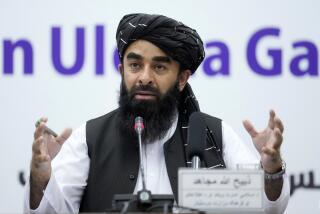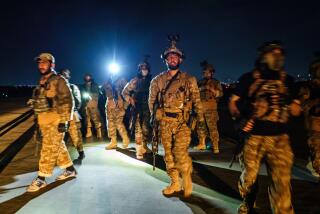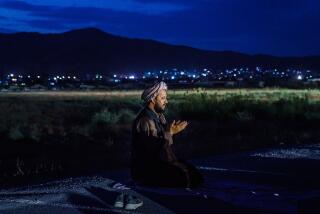Afghan forces formally take over responsibility for protecting nation
- Share via
Reporting from Kabul, Afghanistan — Afghanistan’s national security forces formally took over responsibility for protecting their nation Thursday, days after the U.S.-led foreign combat mission came to a close.
In a speech at the presidential palace, Afghan President Ashraf Ghani congratulated the 350,000 members of the security forces, which include both the military and various police departments, for completing a two-year transition process and taking command of their own destiny.
“In the past 13 years, due to the problems in the region and the world, [our] security was a joint responsibility,” said Ghani, who previously headed a commission that guided the transition. “Now it belongs solely to Afghans.”
“Our citizens can’t live without peace,” Ghani told a gathering that included security officials, lawmakers and his predecessor as president, Hamid Karzai. “The world’s security is linked to Afghanistan’s security.”
Underscoring the challenges facing Afghan security forces, a personal dispute turned into an overnight gun battle in the capital, leaving one person dead, and a stray mortar round hit a wedding party Wednesday, killing at least 26 people.
In his speech, Ghani called on regional neighbors in Central and South Asia to join in the fight against terrorism, saying, “We can either join hands and fight terrorism together or watch as we all drown together.”
In the past, Afghans have accused neighboring countries, particularly Pakistan and Iran, of aiding and abetting the armed opposition in their country.
Rahmatullah Nabil, acting head of the National Directorate of Security, the Afghan intelligence agency, told the gathering that the shift in security responsibility is a turning point in the Afghan war, which began with the U.S.-led invasion in 2001.
Nabil said the withdrawal of foreign troops should leave the Taliban, which often cited their presence as justification for its campaign, with “no more excuse to continue fighting in Afghanistan.”
In a statement issued Wednesday, the Taliban called the international troop withdrawal “a hasty retreat” after a brutal defeat.
Despite Ghani and Nabil’s statements, the Afghan security forces will not be battling the Taliban alone. More than 12,500 foreign soldiers, the bulk of them Americans, remain in Afghanistan to train and assist local soldiers and police. U.S. troops will still be authorized to conduct airstrikes and provide other limited combat support.
For the Afghan people, the overnight deaths in Kabul and the southern province of Helmand emphasized the importance of properly trained security forces to protect the nation of 32 million.
In the capital, a personal dispute between two former militant commanders turned deadly when the son of Din Muhammad Jurat, former deputy interior minister, was killed in a clash with the forces of former commander Haji Rahim.
For residents of the Kartei Parwan neighborhood, the 90-minute fight, which left Jurat’s nephew and other son injured, served as a grim reminder of the fact that the Taliban are not the only threat to the security of the city’s inhabitants.
Esmael, 39, a Kartei Parwan resident who goes by one name, said the Ghani administration must do everything in its power to ensure that there are no repeats of the Wednesday evening attack.
“If the government doesn’t take proper steps, events like this can easily open the eyes of other powerful commanders who seemed to be dormant for the last 13 years,” he said. “The eruption of such rivalries and attacks can only have a negative impact on the people of Kabul, especially those who lived through the civil war.”
The stray mortar round that struck the wedding in Helmand province injured 40 people, according to local media reports. The dead included women and children.
Farid Ahmad, spokesman for the provincial governor, said the mortar accidentally landed at the site in the Sangin district while security forces were battling the Taliban.
A delegation, led by the governor of Helmand, had been dispatched by order of the president to investigate conflicting reports of the situation. Though provincial officials insist the mortar was fired by the opposition, the Taliban have denied any role in the attack.
Latifi is a special correspondent.
More to Read
Sign up for Essential California
The most important California stories and recommendations in your inbox every morning.
You may occasionally receive promotional content from the Los Angeles Times.










